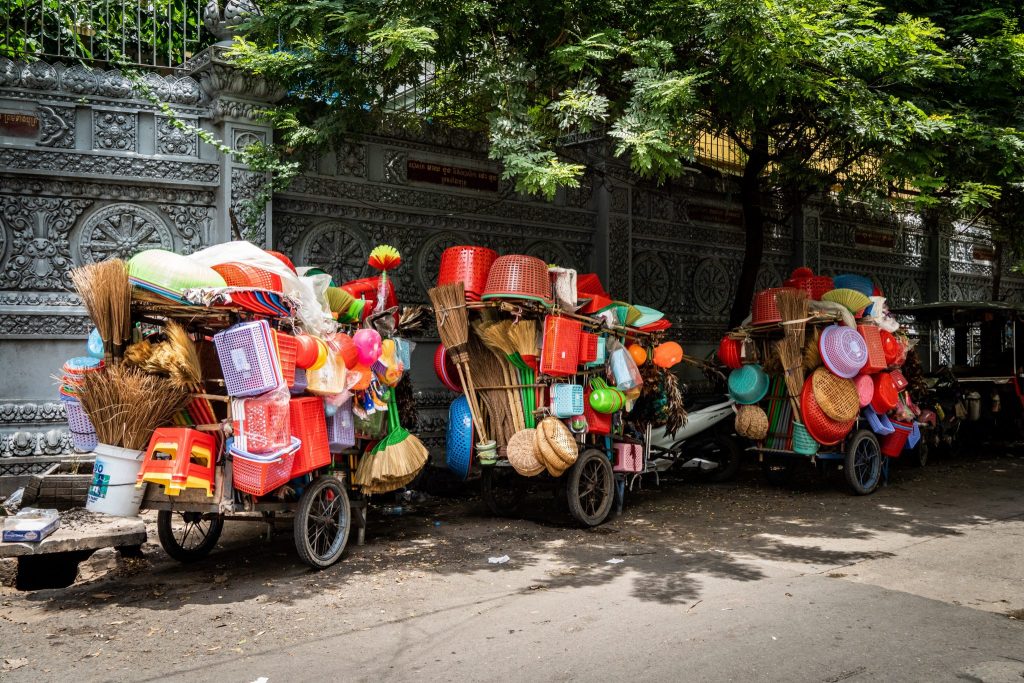Ultimately, the journey towards economic diversification requires robust policies and consistent enforcement, which necessitates a crackdown on corruption. The new government faces a critical decision — to yield to the challenge or to boldly pursue the establishment of a resilient and inclusive economic model. Success in this endeavour will not only validate their leadership but also solidify their legitimacy.
The COVID-19 pandemic in 2020 laid bare the inherent risks of an economic model that is over-reliant on a limited number of sectors and excessively exposed to external markets. A sharp economic contraction from 7 per cent growth in 2019 to 3 per cent in 2020 served as a stark reminder of Cambodia’s susceptibility to external shocks and underscored the imperative of economic diversification.
Cambodia’s economic landscape is dictated by a narrow export base and a circumscribed set of export destinations. Key export commodities such as garments, rice, and cassava, alongside tourism services, constitute approximately 80 per cent of total exports, with the European Union and the United States absorbing 70 per cent of these.
The World Bank’s marginal downward revision of Cambodia’s 2023 growth forecast by 0.1 per cent from an initial 5.5 per cent is predicated on the looming spectre of a global economic deceleration. The confluence of a slowing Chinese economy, a waning demand for garments, a sluggish resurgence of Chinese tourist inflow, tighter financial conditions and a downturn in the construction sector all pose potential headwinds.
But this narrative overlooks the robustness and holistic economic developmental potential that a diversified economy could endow Cambodia with. Sectors such as agro-processing and manufacturing could emerge as game-changers. Harnessing these sectors’ potential, dovetailed with the country’s abundant agricultural resources and burgeoning young demographic, could establish a resilient growth paradigm. This strategy could catapult Cambodia towards its ambitious goal of ascending to high-income status by 2050.
Cambodia’s agro-processing sector represents an untapped wealth of potential, currently stagnating in an underdeveloped state. The nation’s economic strategy has been predominantly focused on the milling of rice, rubber production and pepper cultivation, with a major portion of these raw materials exported. But this approach has precipitated a substantial economic deficit, with losses estimated to be around US$2 billion. When juxtaposed with the agricultural revenues of neighbouring countries like Thailand and Vietnam, which generated income worth US$102 billion and US$44 billion respectively in 2018, the stark disparity becomes evident. Cambodia, in contrast, records a comparatively meagre US$590 million.
Local producers are often caught in a dilemma of oversupply and limited processing capacity. They are compelled to sell their perishable crops at prices arbitrarily — and often unfairly — set by opportunistic buyers, or face the grim prospect of their goods going to waste. An expanded agro-processing industry could address this oversupply and price deflation issue, enabling Cambodia’s producers to extract more value from its agricultural exports.
In parallel to the agro-processing sector, there is an emerging promise in the light manufacturing sector. In 2017, Cambodia was the European Union’s main bicycle supplier, and in 2022, it became one of the world’s top five bicycle exporters.
The skills gap that currently hinders the expansion of Cambodia’s agro-processing and manufacturing capabilities can be addressed effectively through Technical and Vocational Education and Training (TVET). Given that over 50 per cent of Cambodia’s population is of working age, yet less than half have completed high school, TVET’s focus on specific skill acquisition and shorter learning duration aligns well with the nation’s demographic profile. Partnerships with skill-training agencies or large tech companies can be pivotal in this transformation process.
While physical capital inflow, significantly from China, fuels the Cambodian economy, the development of human capital lags behind. To address this, foreign firms should be required to invest a portion of their profits into ongoing training for Cambodian workers for a minimum of three to five years. Such a requirement would coincide with the tax incentive period, accommodating the learning curve of workers in specific industries.
Transitioning to new industries will require time and resources, both of which are currently constrained for Cambodia. The 19 per cent shrinkage in tax revenue in the first half of 2023 forced the government to utilise national savings to address a US$412 million budget deficit. As Cambodia develops, it may lose preferential access to foreign direct investment-rich markets and, like other emerging economies, will need to mobilise domestic resources.
Instead of hiking taxes, which could deter potential investors, the government should focus on curbing corruption, simplifying tax compliance and digitising business operations to lower business operating costs. Such strategies would not only enable businesses to thrive but would also attract domestic investments and new ventures, boosting future voluntary tax revenue.
Affluent Cambodians and private businesses should be encouraged to invest in strategic public–private partnerships to fund the agro-processing industry, particularly for the import of storage and processing technologies, and to support skill training for workers in the manufacturing industry. Technology transfer and innovation could be further spurred by partnerships between foreign and domestic companies, and tax incentives or reductions for tech and machinery imports.
Ultimately, the journey towards economic diversification requires robust policies and consistent enforcement, which necessitates a crackdown on corruption. The new government faces a critical decision — to yield to the challenge or to boldly pursue the establishment of a resilient and inclusive economic model. Success in this endeavour will not only validate their leadership but also solidify their legitimacy.
Heimkhemra Suy is Monitoring and Evaluation Advisor in Phnom Penh, Cambodia.
This article is part of an EAF special feature series on 2023 in review and the year ahead.

